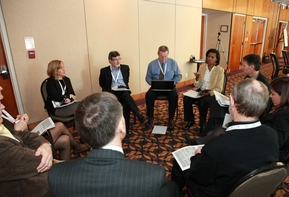TORONTO, Wednesday, Oct. 3, 2012 – C21 Canada, Canadians for 21st Century Learning and Innovation, is set to release its Shifting Minds document on Wednesday, October 3, 2012 at the C21 board meeting in Toronto.
Shifting Minds is a national vision and framework for 21st century models of learning in Canada. Global leaders in education and other sectors of society have identified a number of competencies and skills that are now critical for personal and societal success in the knowledge and digital era. Founded on Seven Guiding Principles, the document serves as a guide for integrating these key competencies and skills into Canada’s learning systems.
“CSBA is proud to be a founding partner in C21. The release of Shifting Minds provides the education sector and in particular school boards the opportunity to reflect and inspire new and innovative practices in support of student outcomes in a global economy,” stated Sandi Urban Hall, President of Canadian School Boards Association.
The Shifting Minds document evolved from the inaugural C21 Canada Summit held last February, which convened 50 of Canada’s education and business leaders in the field of 21st century learning, with the belief that public education in Canada must be transformed to position Canadians for success in the knowledge and digital age.
“Shifting Minds provides Canadians a vision of what their education systems should aspire to become and a blueprint of how to get there,” stated John Kershaw, president of C21 Canada.
Shifting Minds reflects broad input from the private and public sectors. The document is available at http://www.c21canada.org/.
Download: Shifting Minds: A Vision and Framework for 21st Century Learning in Canada (English)
Transformer Les Esprits: L’Enseignement public du Canada une vision pour le XXIe siècle (Français)
-more-
About C21 Canada
C21 Canada is a unique blend of national education associations and knowledge sector businesses united in their belief that 21st century models of learning must be adopted in public education on an urgent basis to position Canadians for economic, social and personal success in the high skills, knowledge and innovation based economy. www.c21canada.org
C21 Canada’s Founding Members: Canadian Education Association, Canadian School Board Association, Dell, EF Educational Tours, IBM, McGraw-Hill Ryerson, Microsoft, Nelson Education, Oxford University Press, Pearson, Scholastic Education, SMART Technologies.
Secretariat: 21st Century Learning Associates, MindShare Learning.
###
Contact: Robert Martellacci
Vice-President, C21 Canada
President & Publisher
Mindshare Learning Report
Cell: 416-569-2106
robert@mindsharelearning.com

